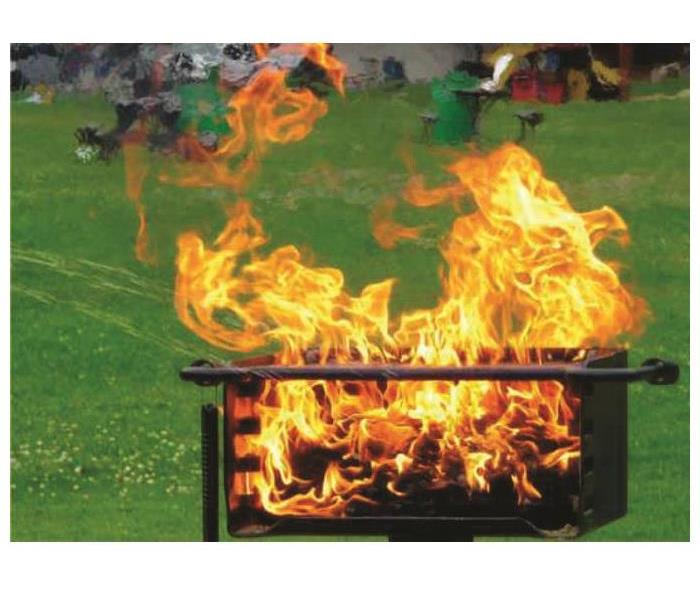Fire Prevention: 5 Lesser-Known fire starters to avoid
9/19/2017 (Permalink)
Here are some surprising hazards that may be lurking in your home. So, in honor of National Fire Prevention Month, and as Part 2 of our “Fire Safety” series, here are 5 lesser-known fire starters to avoid.
1. Dust collection
Dust builds up quickly and can make the perfect kindling — especially clumps that accumulate near electrical sockets and appliances. All it takes is one errant spark to light up a dust bunny before it spreads to nearby curtains or upholstery.
Whenever you sweep floors or dust furniture, pay special attention to vulnerable areas, like around electronics, the washing machine and dryer, and the refrigerator. In addition, don’t ignore hard-to-reach places where dust has likely collected for some time, including behind shelves, atop ceiling fans, underneath the bed, and behind dressers. Not only will your house be cleaner and that much safer, but your sinuses will also thank you.
2. Dead, decaying flowers
Although rare, dead flowers can set off a blaze … and do. Back in 2010, such a case occurred at a home in Little Rock, Arkansas. Dead flowers left in a plastic pot on a sunny porch erupted in a fire that caused $20,000 in damages. Similarly, investigators of a 2012 house fire in Des Moines determined the ignition source to be a wooden pot of dried-up dead flowers and mulch on a hot day.
As a matter of fact, all it takes is some parched organic material (such as flowers, plants, or even compost) plus soaring temperatures to create the right conditions for spontaneous combustion. Additionally, chemicals and nitrates make an inferno all the more plausible. (Personal anecdote: a friend of mine once came home to firefighters putting out a fence blaze ignited by a compost bin. True story!)
With all that said, give those flowers some love. Or, at the very least, be sure to aerate the soil, especially when the mercury climbs. And if you have a compost bin out back, keep it enclosed and constantly tumbled to preserve moisture. No matter how hot it gets, it’ll be much more fire safe.
Check out: Hot Dogs, Hamburgers, and … Baking Soda? Test Your BBQ Safety Knowledge3. Piles of old newspapers
Believe it or not, stacks of old newspapers left near gas and propane containers are the culprit of many fire damage claims. A clutter of paper situated near a vent, space heater, or electrical socket also runs a major risk of starting a fire.
If you’ve acquired an impressive trove of news memorabilia that you want to hold onto, it might be best to digitize them. Not only is it safer, but your future historical insights are more likely to withstand the elements. Otherwise, it’s probably time to take out the recycling.
4. Glass fixtures
You know how magnifying glasses can focus sunlight to burn holes through paper or help start a campfire? Well, household glassware can have the same effect.
Between 2010 and 2015, the London Fire Brigade recorded 125 fires caused by glass fixtures (7 of which happened in the winter). And since London isn’t a sun-clad destination to begin with, those numbers are remarkable.
Be mindful of where you keep your fish tank, mirror, glass high heels, or crystal ball — they may not bode well near a window or skylight.
5. Oil-stained linens and clothes
Clothes, sheets, or cleaning rags that are stained with cooking oil, grease, gasoline, or cleaning agents can run the risk of causing a fire when run through the dryer. What’s more, oil-stained towels have been known to spontaneously combust after they’ve been taken out and folded. Crazy, right?
Anything that’s suffered stains like these may need to be cycled through the wash a few times to ensure there are no flammable remnants. Consumer Reports recommends not using liquid fabric softener, since combustibility tests show they actually expedite the burning process. As a safe alternative, they suggest using dryer sheets.
Of course, things can (and do) happen. Luckily, renters and homeowners insurance may provide a surefire safety net against fires, plus an onslaught of other perils, at and away from home.
If you have any questions about Fire & Water Restoration, feel free to call us at SERVPRO of Bend at (541) 385-7044.

 24/7 Emergency Service
24/7 Emergency Service
